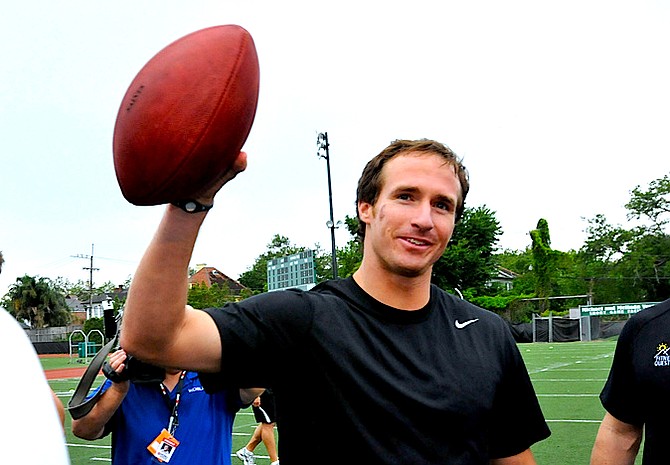Week two of the NFL season wasn't very kind to quarterbacks. The Dallas Cowboys lost Tony Romo to a broken collarbone, and the Chicago Bears lost Jay Cutler to a hamstring injury. Now, we may have to add New Orleans Saints quarterback Drew Brees, who is dealing with a bruised rotator cuff and might not play this weekend, to that list.
The injury occurred in the second quarter of the Saints' game against the Tampa Bay Buccaneers, Sunday, Sept. 20. As Brees dropped back to pass, a Buccaneers defender hit him when his arm was cocked back ready to throw. Brees fumbled the ball, but the Saints recovered it.
In the second half, Brees didn't throw the ball in the manner that the future Hall of Fame quarterback is known for. The injury was especially noticeable on a deep third-quarter throw intended for Brandin Cooks. Brees under-threw the pass, and the Buccaneers' Chris Conte intercepted the ball.
Brees was under duress for the entire game, and the Buccaneers sacked him four times for -36 yards. He was 24 for 38 with 255 yards, one touchdown and one interception in a 26-19 loss.
The Saints dropped to 0-2 after that loss, which put their playoff hopes in jeopardy quickly this season. New Orleans now face a must-win situation against their 2-0 division rival, the Carolina Panthers. Only five teams have ever started 0-3 and went on to make the playoffs.
Brees and Head Coach Sean Payton were the saviors of the Saints franchise after Hurricane Katrina. The quarterback and coach both arrived during the 2006 offseason as the Saints returned to New Orleans.
Payton took a gamble on Brees after the quarterback suffered a shoulder injury that required surgery and after Phillip Rivers replaced him on his former team, the San Diego Chargers. In New Orleans, Brees not only showed he was healthy, but he was thriving.
The duo's ultimate moment came in 2009, when the seemingly cursed Saints won Super Bowl XLIV, and Brees was named the game's MVP. Since winning the Super Bowl, Brees and the Saints haven't been able to return to the NFC Championship game in three playoff appearances. New Orleans has also missed the playoffs twice after the Super Bowl, including last season. Still, the Saints have experienced nearly unprecedented success as a franchise with Brees at quarterback.
The San Diego Chargers drafted him out of Purdue University in the second round of the 2001 NFL Draft. While he was good during his time in San Diego, the Chargers were never completely sold on Brees, and it showed.
In the 2004 NFL Draft, San Diego decided to draft Philip Rivers out of North Carolina State University. Rivers held out for nearly all of the training camp, and Brees remained as starting quarterback in the 2004 season, even going to the 2004 Pro Browl. In 2005, Brees became a free agent, and then the Chargers designated him as a franchise player under a one-year contract, which meant he could be traded or signed to another team. In addition, San Diego would receive two future first-round draft picks.
Brees spent the 2005 season as starting quarterback for the Chargers. Because of an injury, he didn't play in the 2005 Pro Bowl, and after the Chargers refused to increase their contract offer, he began talking to other teams. He signed with the New Orleans Saints in 2006.
At age 36, Brees will try to get treatment this week and hope he can play on Sunday, but even if he does play, New Orleans has to adjust its game plan.There will be little chance of any deep passes from him, so the short-passing game will have to be effective.
Brees will also need much more pass protection than he has received in his first two games. He has been sacked four times, hit seven times and pressured countless times, as he has fumbled twice. In a major concern, Brees has as many touchdown passes as he does interceptions this season, with two each.
The record-setting quarterback hasn't missed time for injury since the 2005 season, when he hurt his shoulder, though he has sat out games when his teams were set in playoff seeding at the end of the season.
Last offseason, Brees suffered an oblique injury that caused him to miss two weeks of training camp, which possibly affected his performance in the 2014 season. Now just two games into this season, the quarterback is injured again after sitting out most of the preseason to keep him healthy.
Just before Super Bowl 50, Brees will turn 37, and the Saints will have some decisions to make heading into the 2016 season. The Saints will owe him more than $27 million next season, which is the last on his current contract.
New Orleans could save $20 million by cutting Brees before the start of next season; however, Payton's contract runs through the 2017 season, so it might be unlikely that he would want to start over for a season or two.
A new precedent for aging NFL quarterbacks is currently being played out in Denver and New England. Peyton Manning of the Broncos is finally feeling the effects of numerous neck surgeries, but Tom Brady for the Patriots seems to be aging like a fine wine—just getting better each year.
Depending on how bad this injury is and how the rest of the season goes, the Saints might have to spend the next few offseasons wondering if Brees will be more like Brady or will end up like Manning.



Comments
Use the comment form below to begin a discussion about this content.